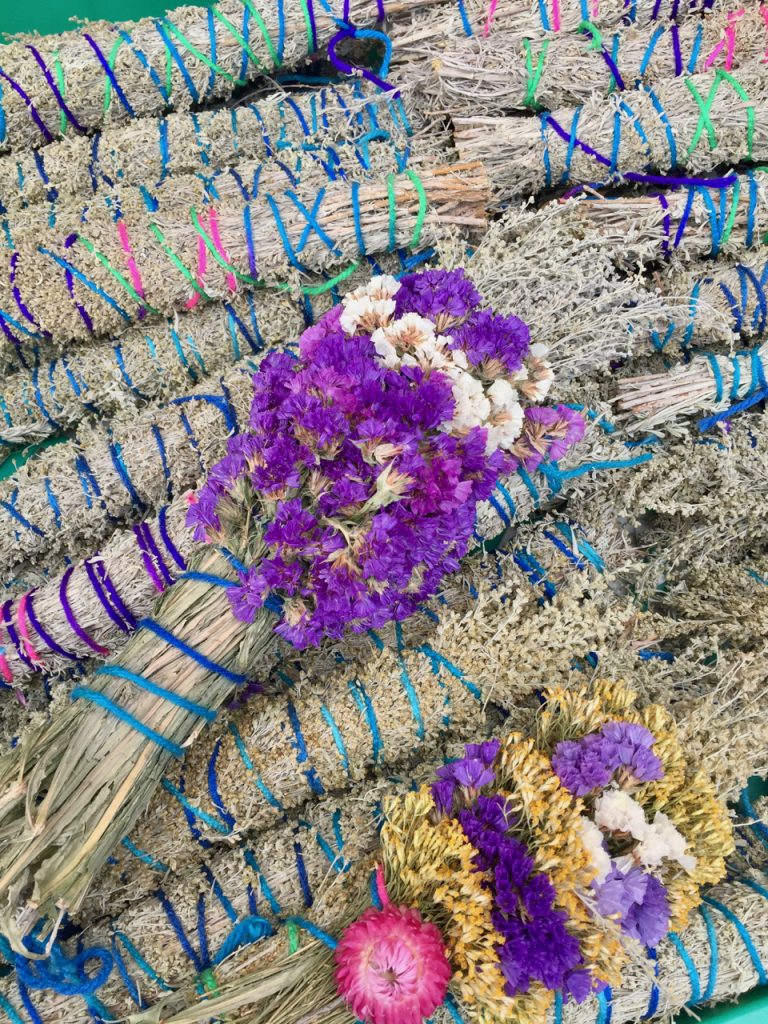This originally appeared as part of the Daily Sip, a website from Charles LaFond, an Episcopal Priest who raises money for the homeless and lives on a horse farm in New Mexico with his dog Kai. offering daily meditations and reflections
 Russian Sage borders many of the fields of Little Bird Farm here in New Mexico. Its silvery-green stalks and lavender-colored flowers give fragrance to the air and color to the land. It has a mystical quality as well – something ancient and cleansing. White Sage is most commonly bundled for smudging in house-blessings but Russian Sage works well too.
Russian Sage borders many of the fields of Little Bird Farm here in New Mexico. Its silvery-green stalks and lavender-colored flowers give fragrance to the air and color to the land. It has a mystical quality as well – something ancient and cleansing. White Sage is most commonly bundled for smudging in house-blessings but Russian Sage works well too.
The use of smoke to cleanse a place is a very old practice. The church has used resins for centuries as a symbol of ascending prayers (and to block unpleasant human and animal odors). In scriptures, incense was representative of the smoke of sacrifice and was brought to Jesus by the Magi as one of the three gifts.
When I first moved to New Mexico, a new friend gave me a smudging stick for my birthday to cleanse my home and to begin a new life here. I light it just before guests arrive – a small ritual of cleansing in my home. “Whatever my failings in this home, may they be cleansed before my guests arrive. May we begin again. May we re-boot.”
Paul Tillich, in his meditation on Romans 5:20, discusses sin and grace as separation and union rather than as moral failing and divine restitution. He says that “sin” should never be spoken or written in the plural. Sin is a condition, as is grace. They are part of being human. We sin. We live in a state of sin and in a state of grace. Many Christians do not much like this reality of the spiritual life because it makes it so much harder to label ourselves and others as “righteous” or as “sinners.” In my experience, “accountability” is a word many leaders use just before they begin scapegoating. Yes. Even in the church.
When I was younger and rather more worried about sin, it was important to be able to label sin, sinners, my own sins, and times of sinfulness. These days I find it much more productive to light some sage and say some prayers, steeped in mindfulness enough to see things and then just get on with life. Sin is a condition more than it is a series of moral failings. Like illness, sin flares up.
I no longer believe that Santa Claus exists, nor do I believe that he had a list of who is naughty and who is nice. I believe Eve was framed, and then suffered from centuries of scapegoating. If we focus on the sin and failures of others, then we need not look so closely at our own sin. A mob focusing on the sin of others has enormous power. And I certainly do not believe that bad children received coal or nothing, while good children received bulging stockings and bountiful presents under the tree. And yet, that story is how many see God. “In God we Trust,” perhaps because we like our lifestyle and associate it with God. White church-goers get presents while pagans in the middle-east and the African continent starve as divine justice? Hmm.
In Advent and Christmas, I sometimes miss my New England farm with its three woodstoves and snow-laden hills. Here in New Mexico Christmas and Advent will be different – filled with luminaria and cinnamon. And burning sage. Sin, yes. But not so much “sins.” When I burn sage I symbolically offer my apology and my hope. Burning sage might be the best Advent practice of all. Well, sage and some hot buttered rum.
It will soon be Advent and time for a consideration of our longing for God. The sweet smoke from burned sage in my home is a reminder of God’s smoldering love rather more than God’s smoldering anger.

